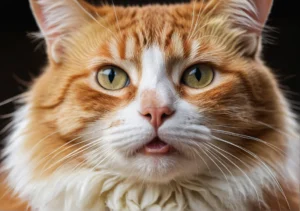Cats are known for their aloofness and independence, but when they feel nauseous, it can be quite concerning for their owners. So, why do cats feel nauseous? Let’s explore the reasons behind this common issue and how you can help your feline friend feel better.
Anatomy of a Cat’s Digestive System
Let’s dive into the fascinating world of a cat’s digestive system. Unlike humans, cats have a short digestive tract that is designed to process a high-protein diet efficiently. This means that food moves quickly through their system, which can sometimes lead to digestive issues like nausea. The stomach of a cat is relatively small, about the size of a walnut, and can easily become upset by various factors. Additionally, cats have a sensitive gag reflex, which can trigger nausea in response to different stimuli.
Common Causes of Nausea in Cats
There are several reasons why your feline friend may be feeling nauseous. Dietary issues are a common culprit, such as eating too quickly or consuming spoiled food. Infections can also cause nausea, including viruses, bacteria, or parasites. Motion sickness may affect some cats, especially during car rides or when they are exposed to unfamiliar movements. Furthermore, underlying health conditions such as kidney disease or liver problems can also lead to feelings of nausea in cats. If your furry companion is experiencing frequent or severe nausea, it’s essential to consult with your veterinarian to determine the root cause and appropriate treatment.
Additional Unique Insight:
In some cases, stress and anxiety can contribute to a cat’s nausea. Just like humans, cats can experience emotional distress that manifests physically, leading to symptoms like vomiting or loss of appetite. Creating a calm and safe environment for your cat, providing enrichment and mental stimulation, and offering reassurance can help alleviate stress-related nausea.
Symptoms of Nausea in Cats
If your furry friend is feeling under the weather, it’s essential to recognize the signs of nausea in cats. Look out for vomiting, lack of appetite, excessive drooling, and lethargy. These indicators can help you understand when your cat is feeling nauseous and needs some extra care.
Home Remedies for Nauseous Cats
When your cat is feeling queasy, there are natural remedies that can help ease their discomfort. Consider offering a bland diet to soothe their stomach, ensuring they stay hydrated to prevent further issues. Additionally, implementing stress reduction techniques can help alleviate your cat’s nausea. Remember that a calm environment can make a world of difference in your furry friend’s well-being.
- Ginger: Adding a small amount of ginger to your cat’s food can help settle their stomach. Just a sprinkle can make a difference in easing their nausea.
- Peppermint: A few drops of peppermint oil mixed with water can be soothing for your cat’s upset stomach. However, always consult your vet before using essential oils with your pet.
- Frequent small meals: Instead of large portions, try feeding your cat small amounts of food throughout the day to avoid overwhelming their stomach.
For more in-depth information on cat health, consider consulting the American Association of Feline Practitioners for additional resources and expert advice.
When to See a Veterinarian
If your furry friend is feeling under the weather and dealing with frequent bouts of nausea, it’s essential to know when it’s time to seek professional help. Persistent symptoms of nausea, such as vomiting, loss of appetite, and lethargy, should not be ignored. These could be signs of an underlying health issue that needs to be addressed promptly by a veterinarian.
Additionally, if your cat’s nausea is accompanied by diarrhea, dehydration, weight loss, or abdominal pain, it’s crucial to schedule a visit to the vet. These could indicate a more serious condition that requires medical attention. Remember, your cat’s health is top priority, so don’t hesitate to seek professional care if you notice any concerning symptoms.
Treatment Options for Nausea in Cats
When your feline friend is feeling queasy, there are several treatment options available to help alleviate their discomfort. Medications prescribed by a veterinarian can help manage nausea and vomiting in cats. These may include anti-nausea medications or digestive aids to soothe their upset stomach.
In addition to medications, making dietary changes can also be beneficial for cats experiencing nausea. Feeding smaller, more frequent meals, providing easily digestible food, or even switching to a specialized diet for sensitive stomachs may help reduce your cat’s symptoms. Hydration is key, so ensure your cat has access to fresh water at all times.
Lifestyle adjustments can also play a role in managing your cat’s nausea. Minimizing stress, providing a calm environment, and ensuring they get enough rest can all contribute to their overall well-being. Remember, every cat is unique, so finding the right combination of treatments may require some trial and error. Just be patient and attentive to your cat’s needs to help them feel better.
For more information on feline nausea treatment options, check out this helpful resource.
Preventing Nausea in Cats
Nausea in cats can be distressing for both the feline and their owner. To help prevent nausea in your furry friend, it’s essential to focus on their diet. Ensure your cat is eating high-quality food that is gentle on their stomach. Opt for easily digestible meals and avoid sudden changes in their diet, which can trigger nausea.
Regular vet check-ups are also crucial in maintaining your cat’s overall health. Your vet can identify any potential underlying issues that may be causing nausea and provide appropriate treatment. Additionally, keeping your cat’s environment calm and stress-free can help prevent nausea. Cats are sensitive creatures, so minimizing stressors like loud noises or sudden changes in their routine can go a long way in preventing nausea episodes.
Fun Facts About Cats and Nausea
Did you know that cats have a highly developed sense of smell, which can contribute to their susceptibility to nausea? Their keen sense of smell can sometimes be overwhelmed by strong odors, leading to feelings of queasiness. It’s important to be mindful of this and avoid exposing your cat to strong scents that could trigger nausea.
Another interesting fact is that cats can experience motion sickness, just like humans. If your cat tends to get nauseous during car rides, try to make the journey as smooth as possible and provide a comfortable and secure carrier for them to travel in. You can also consult with your vet about potential remedies or strategies to make car rides more tolerable for your furry companion.
And remember, if you suspect that your cat is feeling nauseous, always consult with your veterinarian for proper diagnosis and treatment options. Your vet can provide personalized guidance based on your cat’s specific needs and help ensure they stay happy and healthy.
Alex, a passionate animal lover, has experience in training and understanding animal behavior. As a proud pet parent to two dogs and three cats, he founded AnimalReport.net to share insights from animal experts and expand his knowledge of the animal kingdom.




